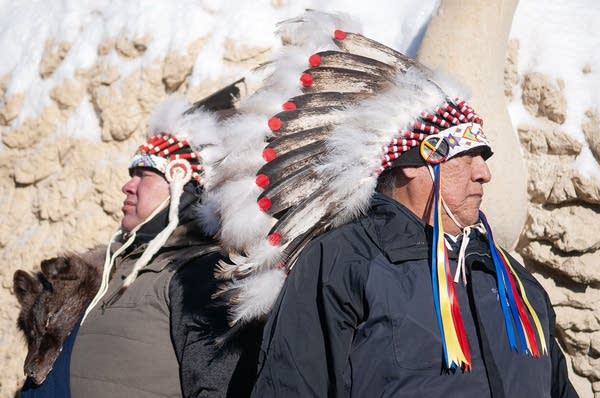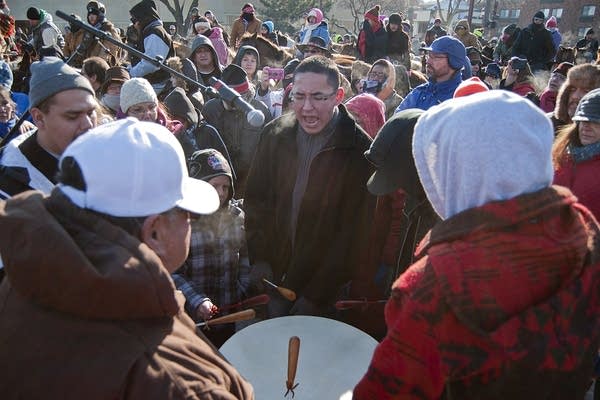Lakota spiritual leader Jim Miller, founder of Dakota 38+2 ceremonial ride, dies at 74

Go Deeper.
Create an account or log in to save stories.
Like this?
Thanks for liking this story! We have added it to a list of your favorite stories.
James “Jim” Gerald Miller, 74, Lakota spiritual leader and founder of the Dakota 38+2 rides, died on March 3 from cancer at his home near Porcupine, S.D.
His nephew Todd Finney, whose Dakota name is Ta Can’te Was’te Yuha Omani (He Who Walks With His Good Heart), described Miller as a veteran, a dreamer and a leader. He said Miller often inspired others through his actions and was known to embrace strangers like family.
Miller developed an aggressive form of cancer similar to other US soldiers exposed to agent orange during the Vietnam War, according to Finny.
“My Uncle Jim is hands down the greatest man I’ve ever known,” Finney said. “A man who wasn’t afraid to talk about his feelings, but also, that he was one of the most ferocious warriors that ever walked the planet. But, you never saw that side, because that side wasn’t necessary. The side of being a loving uncle, a loving father, loving husband, loving grandfather, a loving patriarch, that’s what was necessary. And so, he showed it to us and laid down a path for a lot of us to walk on.”
Turn Up Your Support
MPR News helps you turn down the noise and build shared understanding. Turn up your support for this public resource and keep trusted journalism accessible to all.

Inspired by a dream
In 2005, Miller dreamt of Dakota people returning home to Minnesota on horseback. Eventually, the ceremonial ride became reality in 2008 with descendants of the executed men in the group. The rides happened every year until it ended this past December after the last of the original riders retired and Miller’s dream was fulfilled.
Finney said Miller spent his life trying to spread a message and his voice was heard around the world through the Dakota 38+2 rides.
“He became a voice for Indigenous people everywhere, that they could make a difference [and] that they could do something that if they lived in prayer, and tried to love everyone around them they could actually make a difference in this world,” Finney added.

The rides were intended to educate people about what happened during and after the U.S.-Dakota War of 1862. The war started when Indian agents withheld food and supplies guaranteed under treaty with the Dakota people, which was part of an effort to force the Dakota off their homeland. Hundreds died during the war that lasted a little over a month.
More than 300 Dakota warriors were sentenced to death, but after public outcry by religious leaders over the proposed executions, President Abraham Lincoln signed the death warrants of 38 men.
On Dec. 26, 1862, they were hanged in Mankato. It remains the largest single-day mass execution in U.S. history. Two more Dakota chiefs were executed two years later.
Troops also removed 1,700 Dakota people, mostly women and children, from Lower Agency to Fort Snelling in November 1862. Many incarcerated Dakota women and children died of cold and hunger.

Hope and healing
Despite the grim history the rides also symbolized hope and healing. The annual events also introduced the Dakota culture to younger generations and taught them their history. Finney said generations of Dakota would move together as a family. Miller’s vision came into fruition and continues to inspire.
“He took a dream, and he talked to his elders and he prayed about it,” Finny said. “He was the voice for people had been forgotten from an event that had been forgotten and buried. Without shaming, without villainizing he stated the facts and he said, ‘We're gonna forgive everyone everything. And we're gonna pray for everyone when we do this, this isn't just about us, it's about helping to heal the world.’”
Finney said that his uncle would never leave a room or let anyone go without telling them “I love you,” regardless if they just met.
At each ride, newcomers were welcomed with a hug and the riders would feed them and shelter them during their journey. Ride supporters would help them along the way. Strangers became family.
Finney said it’s a type of love that Miller embodied that marks his legacy. He said while family and friends grieve his uncle’s death, they’re also finding peace in someday reuniting with him.
“The comfort comes when it’s your time, and they’re all waiting,” he said. “Until then, we just live our lives to the best of our possibilities and we remember that they’re watching over us, and they’re praying for us. Some day, we’ll see them all. They’re enjoying the whole new life that they’ve discovered being truly free, because they live their lives well to the best of their abilities.”

Commemorations in two states
A celebration of life for Miller will be held at All Nations Indian Church in Minneapolis on Saturday March 11 from 1 p.m. to 9 p.m. There’ll be a potluck and a screening of the documentary “Dakota 38.” Friends and family will have an opportunity to share memories.
On Sunday, March 12, a wake service will start at 1 p.m. at Pahin Sinte Owayewa School in Porcupine, S.D. Funeral services start at 10 a.m. on Monday, March 13 at the school.
The burial services are at 2:30 p.m. at Black Hills National Cemetery in Sturgis, S.D. Arrangements are made through Sioux Funeral Home of Pine Ridge, S.D.


